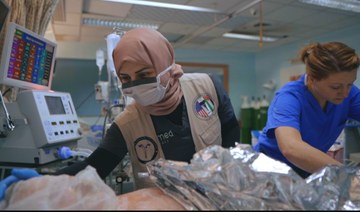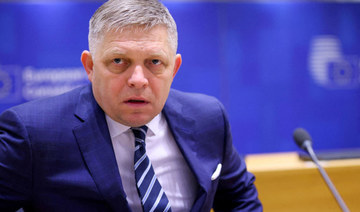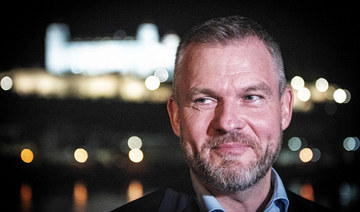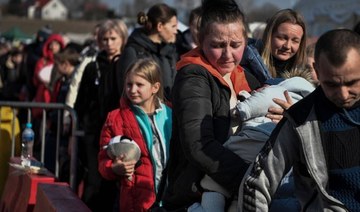WASHINGTON: President Joe Biden met with new House Speaker Mike Johnson and Democratic leader Hakeem Jeffries at the White House on Thursday to discuss his request for nearly $106 billion for Israel, Ukraine and other national security needs.
Johnson, a staunch conservative allied with Donald Trump, has shown little interest in providing additional money from Congress to support Ukraine in its war against Russia.
Later, the new Republican speaker insisted Congress is “not going to abandon” Ukraine.
Instead, Johnson said House Republicans would first bring a separate bill to provide $14.5 billion in aid to Israel, but they need more information about the Biden administration’s Ukraine strategy.
“We can’t allow Vladimir Putin to prevail in Ukraine because I don’t believe it would stop there,” Johnson said on Fox News’ “Hannity,” referring to the Russian president. But he said, “We must stand with our important ally in the Middle East and that’s Israel.”
The new Republican leader who swept into office nearly a month after the ouster of Rep. Kevin McCarthy as speaker had a busy first full day in office, having inherited many of the same political problems that tormented past GOP leaders and challenged their tenure as speaker.
In the morning, Johnson said “prayer is appropriate” as a response to the mass shootings in Maine.
Johnson, an evangelical Christian from Louisiana, declined to take questions, including about the possibility of any gun violence legislation from Congress.
“Prayer is appropriate at a time like this, that the evil can end and the senseless violence can stop,” he said.
The House convened with a bustle of activity, making up for lost time during the weeks of chaos since McCarthy’s ouster as speaker. But the initial goodwill toward Johnson blurs the political fault lines challenging his ability to lead the GOP majority in the face of daunting issues ahead.
By Nov. 17, the Congress must fund the government again or risk a federal shutdown. Biden wants nearly $106 billion in military and humanitarian aid for Israel and Ukraine. And Republicans are eager to resume their impeachment inquiry into Biden over his son Hunter’s business dealings.
“Enough of the chaos, enough of the dysfunction,” said Jeffries, D-N.Y., adding it was time for Congress to get back to business.
Jeffries said Democrats were “heartbroken” over the latest shootings and stand with the people of Maine in every way possible, including discussing how Congress can address gun violence.
Johnson said he and Biden met together for more than 15 minutes before the other party arrived.
“It was a productive meeting,” Johnson told reporters back at the Capitol. “I enjoyed my visit with the president.”
Biden met with Johnson and Jeffries before the House leaders joined a classified briefing with other congressional lawmakers on the assistance package, according to a White House official.
The briefing in the Situation Room for Johnson and other House leaders on the emergency funding request was the first time the new speaker, who opposes the aid to Ukraine, was getting a close airing from White House officials about Biden’s case for the money. The White House has conducted similar briefings in recent weeks.
Biden had called Johnson to congratulate him after his election Wednesday and said it was “time for all of us to act responsibly” to fund the government and provide that foreign aid. “We need to move swiftly,” the president said in a statement.
Johnson, 51, swept through on the first ballot with support from all Republicans anxious to put weeks of tumult behind and get on with the business of governing. He was quickly sworn as speaker and is now second in line to the presidency, after the vice president.
While not the Republicans’ top choice, Johnson had few foes and an important backer in Donald Trump.
At the Capitol on Thursday, Johnson sat down with Australian Prime Minister Anthony Albanese, who told reporters afterward that he had a “very good” meeting with the new speaker.
Johnson met later with Senate Republican Leader Mitch McConnell, who said on social media they had a “great meeting.” He has also heard from Senate Majority Leader Chuck Schumer, D-N.Y., who told the new speaker in a Wednesday call that a bipartisan agreement with Democrats is the only way to avoid a shutdown.
In winning the gavel, Johnson, who has been in the House for less than a decade, drew together fellow Republicans through his faith, conservative roots and Trump’s nod after more seasoned leaders had failed.
“I’m a Bible-believing Christian,” Johnson told Fox’s Sean Hannity.
The speaker said when he’s asked his views on the issues, he advises: “Well, go pick up a Bible off your shelf and read it, that’s my worldview. That’s what I believe.”
Democrats said Johnson, a lawyer specializing in constitutional issues, was an extreme conservative, a strict opponent of abortion access and an architect of Trump’s legal effort to overturn the 2020 presidential election he lost to Democrat Biden.
After Johnson’s election, lawmakers approved a resolution Wednesday saying the House “stands with Israel” and “condemns Hamas’ brutal war.” They next turned to a stalled government funding bill.
Rather than take a scheduled work period at home, Republicans rearranged the House calendar to return to Washington next week and keep pushing through the various government funding bills before the Nov. 17 deadline.
In a letter to colleagues, Johnson outlined priorities that include providing a short-term funding bill, into next year, to prevent a November shutdown — almost the same move that led to McCarthy’s ouster.
“Speaker Johnson has been very clear that we’ve got to secure America’s border, we want to support Israel,” said Majority Leader Steve Scalize, who conferred with Johnson ahead of the White House meeting. “But all of the other items that the President is talking about run secondary.”
Republican Rep. Michael McCaul of Texas, the chairman of the House Foreign Affairs Committee, said Johnson is thoughtful and smart, and understands that aid for Ukraine is a national security issue, despite opposition from other Republicans in their majority.
“And what I saw in the Situation Room was I thought he was very open to the idea,” said McCaul.
To avoid a shutdown, Johnson will need to balance far-right demands with the realities of keeping the government functioning. Most Republicans voted against the budget deal McCarthy, R-Calif., struck with Biden earlier this year, demanding steeper spending cuts.
Similar Republican infighting has chased three other GOP speakers to early departures. The difference now is that Republican rules allow any single lawmaker to force a vote to remove the speaker from office.
In meeting with Biden, new Speaker Mike Johnson says GOP won’t abandon Ukraine but will aid Israel first
https://arab.news/n3qh5
In meeting with Biden, new Speaker Mike Johnson says GOP won’t abandon Ukraine but will aid Israel first

- While Johnson has spoken of the importance of helping fund Israel in the fight against Hamas, he has shown little interest in providing more money for Ukraine as it battles Russia
- To avoid a government shutdown, Johnson will need to balance far-right demands with the realities of keeping the government functioning.
India says it is working to repatriate UN staffer killed in Gaza

- Waibhav Anil Kale, who was working with the UN Department of Safety and Security, and was killed while heading to the European Hospital in Rafah along with a colleague, who was wounded in the incident
NEW DELHI: India said on Wednesday it was working to repatriate the body of a former Indian Army officer serving as a UN staffer, who was killed in Gaza when his vehicle was hit by what the UN said was tank fire in Rafah where only Israeli tanks are present.
The staffer, Waibhav Anil Kale, was working with the UN Department of Safety and Security and was heading to the European Hospital in Rafah along with a colleague, who was wounded in the incident. The UN said he was the first international UN staffer killed in Gaza since the war began on Oct. 7, taking the total UN death toll to 191.
UN Secretary General’s deputy spokesperson Farhan Haq said on Tuesday the UN had set up a fact-finding panel to determine the responsibility for Kale’s death.
“It’s very early in the investigation, and details of the incident are still being verified with the Israeli Defense Force,” he told a press cconference. Asked by reporters about the shots fired on the vehicle, he said, “we believe it came from a tank in the area” and later added, it was “safe” to assume that only the IDF tanks in that region. There are 71 international UN staff members in Gaza currently, he said. The IDF said in a statement on Monday that the incident was “under review” and the IDF had not been made aware of the vehicle’s route. But an initial inquiry indicated that “the vehicle was hit in an area declared an active combat zone.”
The Hamas-run government’s media office accused Israel of “deliberately targeting foreign staff in the Gaza Strip.”
India’s Foreign Ministry said its diplomatic missions were “in touch with relevant authorities” on the investigation into Kale’s death, and helping to bring home his body.
In a statement on Monday after Kale’s death, UN Secretary General Antonio Guterres reiterated an “urgent appeal for an immediate humanitarian ceasefire and for the release of all hostages,” saying the conflict in Gaza was continuing to take a heavy toll “not only on civilians, but also on humanitarian workers.” He has demanded explanations for all their deaths.
ICC ‘excited’ as cricket’s newest stadium launched in New York

- Thirty-four thousand-capacity stadium will host hotly-anticipated India-Pakistan clash on June 9
- Stadium features infrastructure from Las Vegas Formula 1 circuit, drop-in pitches prepared in Florida
NEW DELHI: The newly-built Nassau County International Cricket Stadium, near New York, was launched on Wednesday with the sport’s world body “excited” to conquer new territories through the T20 World Cup in June.
The 34,000-capacity stadium, with infrastructure from the Las Vegas Formula 1 circuit and drop-in pitches prepared in Florida, will host the hotly-anticipated India-Pakistan clash on June 9, among its eight scheduled World Cup games.
The showpiece 20-over event will be co-hosted by the West Indies and the United States starting June 1 with New York, Florida and Dallas as venues.
The International Cricket Council (ICC) remains happy with the focus on the India-Pakistan clash and the Nassau project as part of bringing the game to the US.
“Yeah, absolutely! We can run that game anywhere and the interest in the fixture would be immense,” Chris Tetley, the ICC’s head of events, told reporters in a media roundtable.
“The news stories that we have seen and the media coverage in the US itself as well as among the cricket media around the world. I have not seen that before around an ICC event.”
Tetley added: “We are really excited to bring the T20 World Cup cricket to the US and the opportunity that it presents to the sport and from what I can see there is an audience really waiting for us to come.”
T20 Cricket will also feature as one of five new sports at the Los Angeles Olympics in 2028.
Making a cricket stadium in Nassau remained a huge challenge for the ICC, who got in Adelaide Oval curator Damian Hough for the job.
Hough created the first drop-in pitch in Adelaide in 2013 and the latest strips at the Nassau County ground promise good cricket and balance between bat and ball.
“People shouldn’t be concerned about drop-in pitches,” said Hough.
“They are proven around the world, definitely in Australia. Some of the best cricket is played on drop-in pitches and are really successful.”
Slovak PM’s ‘life in danger’ and in operating theater: interior minister

- Matus Sutaj Estok: ‘We received information from the operating doctors that the prime minister is in a critical condition and his life is in danger and he is still in the operating theater’
- European Commission President Ursula von der Leyen condemned what she described as a ‘vile attack’
BANSKA BYSTRICA, Slovakia: Slovak Prime Minister Robert Fico’s life “is in danger” and he is still in the operating theater after being shot multiple times, the country’s interior minister said on Wednesday.
“We received information from the operating doctors that the prime minister is in a critical condition and his life is in danger and he is still in the operating theater,” Matus Sutaj Estok told reporters at the hospital where Fico is being treated.
Reports on TA3, a Slovakian TV station, said that Fico, 59, was hit in the stomach after four shots were fired outside the House of Culture in the town of Handlova, some 150 kilometers northeast of the capital, where the leader was meeting with supporters. A suspect has been detained, it said.
Police sealed off the scene, and Fico was taken to a hospital in Banska Bystrica.
The shooting in Slovakia comes three weeks ahead of crucial European Union Parliament elections, in which populist and hard-right parties in the 27-nation bloc appear poised to make gains.
Deputy speaker of parliament Lubos Blaha confirmed the incident during a session of Parliament and adjourned it until further notice, the Slovak TASR news agency said.
Slovakia’s major opposition parties, Progressive Slovakia and Freedom and Solidarity, canceled a planned protest against a controversial government plan to overhaul public broadcasting that they say would give the government full control of public radio and television.
“We absolutely and strongly condemn violence and today’s shooting of Premier Robert Fico” said Progressive Slovakia leader Michal Simecka. “At the same time we call on all politicians to refrain from any expressions and steps which could contribute to further increasing the tension.”
President Zuzana Caputova condemned “a brutal and ruthless” attack on the premier.
“I’m shocked,” Caputova said. “I wish Robert Fico a lot of strength in this critical moment and a quick recovery from this attack.”
Fico, a third-time premier, and his leftist Smer, or Direction, party, won Slovakia’s Sept. 30 parliamentary elections, staging a political comeback after campaigning on a pro-Russian and anti-American message.
Critics worried Slovakia under Fico would abandon the country’s pro-Western course and follow the direction of Hungary under populist Prime Minister Viktor Orbán.
Thousands have repeatedly rallied in the capital and across Slovakia to protest Fico’s policies.
Condemnations of political violence came from leaders across Europe.
European Commission President Ursula von der Leyen condemned what she described as a “vile attack.”
“Such acts of violence have no place in our society and undermine democracy, our most precious common good,” von der Leyen said in a post on X.
Leaders in Latvia and Estonia also quickly condemned political violence.
Polish Prime Minister Donald Tusk wrote on the social media network X: “Shocking news from Slovakia. Robert, my thoughts are with you in this very difficult moment.”
EU agrees on a new migration pact, as mainstream parties hope it will deprive the far right of votes
EU agrees on a new migration pact, as mainstream parties hope it will deprive the far right of votes

- EU government ministers approved 10 legislative parts of The New Pact on Migration and Asylum
- Mainstream political parties believe the pact resolves the issues that have divided member nations since migrants swept into Europe in 2015, most fleeing war in Syria and Iraq
BRUSSELS: European Union nations endorsed sweeping reforms to the bloc’s failed asylum system on Tuesday as campaigning for Europe-wide elections next month gathers pace, with migration expected to be an important issue.
EU government ministers approved 10 legislative parts of The New Pact on Migration and Asylum. It lays out rules for the 27 member countries to handle people trying to enter without authorization, from how to screen them to establish whether they qualify for protection to deporting them if they’re not allowed to stay.
Hungary and Poland, which have long opposed any obligation for countries to host migrants or pay for their upkeep, voted against the package but were unable to block it.
Mainstream political parties believe the pact resolves the issues that have divided member nations since well over 1 million migrants swept into Europe in 2015, most fleeing war in Syria and Iraq. They hope the system will starve the far right of vote-winning oxygen in the June 6-9 elections.
However, the vast reform package will only enter force in 2026, bringing no immediate fix to an issue that has fueled one of the EU’s biggest political crises, dividing nations over who should take responsibility for migrants when they arrive and whether other countries should be obligated to help.
Critics say the pact will let nations detain migrants at borders and fingerprint children. They say it’s aimed at keeping people out and infringes on their right to claim asylum. Many fear it will result in more unscrupulous deals with poorer countries that people leave or cross to get to Europe.
WHY ARE THE NEW RULES NEEDED?
Europe’s asylum laws have not been updated for about two decades. The system frayed and then fell apart in 2015. It was based on the premise that migrants should be processed, given asylum or deported in the country they first enter. Greece, Italy and Malta were left to shoulder most of the financial burden and deal with public discontent. Since then, the ID-check-free zone known as the Schengen Area has expanded to 27 countries, 23 of them EU members. It means that more than 400 million Europeans and visitors, including refugees, are able to move without showing travel documents.
WHO DO THE RULES APPLY TO?
Some 3.5 million migrants arrived legally in Europe in 2023. Around 1 million others were on EU territory without permission. Of the latter, most were people who entered normally via airports and ports with visas but didn’t go home when they expired. The pact applies to the remaining minority, estimated at around 300,000 migrants last year. They are people caught crossing an external EU border without permission, such as those reaching the shores of Greece, Italy or Spain via the Mediterranean Sea or Atlantic Ocean on boats provided by smugglers.
HOW DOES THE SYSTEM WORK?
The country on whose territory people land will screen them at or near the border. This involves identity and other checks -– including on children as young as 6. The information will be stored on a massive new database, Eurodac. This screening should determine whether a person might pose a health or security risk and their chances of being permitted to stay. Generally, people fleeing conflict, persecution or violence qualify for asylum. Those looking for jobs are likely to be refused entry. Screening is mandatory and should take no longer than seven days. It should lead to one of two things: an application for international protection, like asylum, or deportation to their home country.
WHAT DOES THE ASYLUM PROCEDURE INVOLVE?
People seeking asylum must apply in the EU nation they first enter and stay until the authorities there work out what country should handle their application. It could be that they have family, cultural or other links somewhere else, making it more logical for them to be moved. The border procedure should be done in 12 weeks, including time for one legal appeal if their application is rejected. It could be extended by eight weeks in times of mass movements of people. Procedures could be faster for applicants from countries whose citizens are not often granted asylum. Critics say this undermines asylum law because applicants should be assessed individually, not based on nationality. People would stay in “reception centers” while it happens, with access to health care and education. Those rejected would receive a deportation order.
WHAT DOES DEPORTATION INVOLVE?
To speed things up, a deportation order is supposed to be issued automatically when an asylum request is refused. A new 12-week period is foreseen to complete this process. The authorities may detain people throughout. The EU’s border and coast guard agency would help organize joint deportation flights. Currently, less than one in three people issued with an order to leave are deported. This is often due to a lack of cooperation from the countries these people come from.
HOW HAS THE ISSUE OF RESPONSIBILITIES VS OBLIGATIONS BEEN RESOLVED?
The new rules oblige countries to help an EU partner under migratory pressure. Support is mandatory, but flexible. Nations can relocate asylum applicants to their territory or choose some other form of assistance. This could be financial -– a relocation is evaluated at 20,000 euros ($21,462) per person -– technical or logistical. Members can also assume responsibility for deporting people from the partner country in trouble.
WHAT CHALLENGES LIE AHEAD?
Two issues stand out: Will member countries ever fully enact the plan, and will the EU’s executive branch, the European Commission, enforce the new rules when it has chosen not to apply the ones already in place? The commission is due to present a Common Implementation Plan by June. It charts a path and timeline to get the pact working over the next two years, with targets that the EU and member countries should reach. Things could get off to a rocky start. Hungary, which has vehemently opposed the reforms, takes over the EU’s agenda-setting presidency for six months on July 1.
Calls mount on Polish government to expel Israeli envoy

- Israel dismissed calls for accountability after killing Polish aid worker in Gaza
- Ambassador compares peaceful protests in Poland to Nazi rallies
WARSAW: Polish activists on Wednesday submitted a nationwide petition for the government to immediately expel the Israeli ambassador over war crimes in Gaza.
Protests against Israel’s bombardment of the Palestinian enclave have been a regular occurrence in Poland since the beginning of the onslaught in October.
One of the main groups organizing the rallies and meetings to extend political pressure, and bring Poles closer to Palestinian history and culture, is the initiative Wschod — a movement of young activists dedicated to social justice.
Wschod’s petition to expel the Israeli envoy, Yacov Livne, from Poland, was signed by 7,931 people as of Wednesday.
“I believe that the petition is an important signal to the Polish government from the Polish people,” Zofia Hecht, a member of Wschod, told Arab News as the activists submitted the petition to the Ministry of Foreign Affairs in Warsaw.
“There is a large group of people who really do not agree with what Israel is doing to Palestinians, and that we do not agree to normalize relations with such a terrorist entity that is Israel.”
Poland recognizes Palestinian statehood and has voted in favor of the UN’s recent resolutions to demand an immediate ceasefire in Gaza, and to recognize backing Palestine’s bid for permanent membership status.
A close ally of the US, the Polish government has avoided vocal criticism of Tel Aviv and its war on Gaza, where Israeli forces have over the past seven months killed at least 35,000 people — a large majority women and children — and injured 80,000 more.
UN agencies and experts have repeatedly accused Israel of committing war crimes and crimes against humanity in Gaza. The International Court of Justice in January also found it plausible that Tel Aviv’s actions in the enclave could amount to genocide.
“We think that the previous actions taken by the Polish government to prevent the Israeli genocide in Gaza were not sufficient,” said Emil Al-Khawaldeh, Wschod’s Palestine campaign coordinator.
“We expect the Polish government to at least respond to our petition signed by almost 8,000 people, and to meet our demands to expel the Israeli ambassador.”
The petition was created when Poles began to pay more attention to Gaza after the killing of a Polish national, Damian Sobol, who was one of the seven World Central Kitchen aid workers targeted and killed by Israeli troops in early April.
“In April, when Israel killed a Polish citizen, the Israeli ambassador took to Twitter to publish accusations of antisemitism,” Al-Khawaldeh said, citing Livne’s posts, which included labeling a Polish parliament deputy speaker as an “antisemite” for publicly charging Israel with war crimes.
“Until now, the Israeli ambassador has neither apologized for his own words nor, on behalf of the state of Israel, for murdering a Polish citizen,” he added.
Wschod’s petition to the government says that “there is no place” in Poland for an ambassador of a “state committing genocide” and demands that he be “immediately” expelled.
“It is absurd that in a country historically affected by genocide, hatred and hostility, we allow the holding of office by a person who represents the government of a country committing war crimes against innocent Palestinian civilians,” it reads.
About 6 million Polish citizens, including 3 million Polish Jews, were killed by German forces during the invasion and occupation of Poland in the Second World War. The occupation policies have been recognized in Europe as a genocide.
Eight decades later, as Poles unite and take to the streets to prevent a genocide of another people, Al-Khawaldeh, who is Polish Palestinian, and Hecht, who is Jewish, said that they have faced accusations of antisemitism.
The accusations regularly come from the Israeli ambassador, who, in a radio interview in November, went as far as to compare the Polish peace activists to Nazis.
“We’ve been holding peaceful marches in Warsaw and there’s been no single security incident. But in November, the Israeli ambassador compared the marches to Nazi rallies ... he compared us with the Nazi Germany of the 1930s,” Al-Khawaldeh said.
“Polish Jews are also protesting with us. They are organizing protests in Poland, peaceful protests, they are also having wonderful speeches against Israeli war crimes, against Israeli genocide in Gaza. This accusation is absurd.”



















